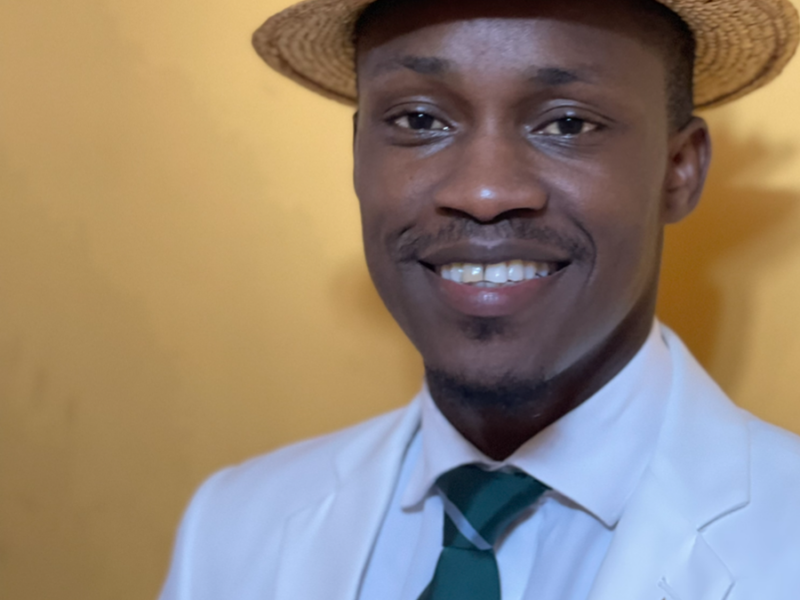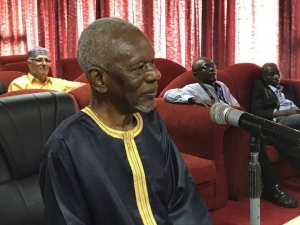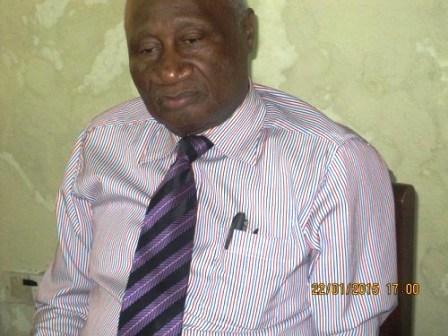Fifth IMC/Zain National Media Awards: Remarks by the British High Commissioner, Mr Ian Hughes
Minister for Information, Sir, Brendan Behan once said that all news is good news, except for one’s own obituary. I am glad to see you safely back from the United States to prove that reports of your demise were premature. (Photo: Mr. Ian Hughes)
Minister for Social Welfare, Gender and Children’s Affairs, Sir, I am glad to see you again so soon.
Chair of the IMC, Madam, I thank you for this opportunity to speak to so distinguished a gathering.
I am delighted to be here tonight to at the fifth IMC/Zain National Media Awards to help recognise the very best in the Photo Journalism, Cartoons and Sports categories and to support not only the work of the Independent Media Commission but also the contribution of Sierra Leone’s vibrant and colourful media to the political, social and economic life of this country.
368 days ago I arrived in Freetown as a new-minted British High Commissioner. Sitting at my desk on my first Monday, I found an invitation to participate in the Fourth IMC/Zain event taking place that very Friday. Given the importance of the media, I could not bring myself to decline. So, 364 days ago today I stood on this same stage at this same microphone to speak to this same audience. At that time, I knew little about Sierra Leone, so I drew on 30 years’ experience in different countries to speak in general terms about why I believe that a lively and exuberant media is essential for a healthy and effective democracy.
I said then that the Awards that we are were to celebrate went right to the heart of what freedom of expression is all about. And that this was something the British Government wholeheartedly supported because freedom of expression is an essential component of democracy, which is in its essence a dialogue between government and people to establish how a country will be governed, by whom, in what way and at what cost. Without the media to facilitate it, that dialogue becomes stunted and democracy stutters and runs out of steam.
But I have to confess that so much has happened since then that I don’t remember much about that speech. What I do remember vividly is the realization later that evening that a bombshell of lady a singer in a va-va-voom dress was intent on dragging me onto the dance floor in front of the cameras and that my first appearance on Salone TV was going to be quite a bit hotter than the Foreign Office normally expects from its Ambassadors. Phew!
While the free press that I talked about last year is essential for democracy to work, it is only one side of the coin. A responsible press is also critical for ensuring transparent and accountable systems of Government and promoting free, transparent and fair elections.
Some governments seek to draw lines in the sand that the media should not cross and want to sanction journalists who cross them. I am glad that Sierra Leone is not one of these. I cannot think of a single country where regulation of the media has not given politicians and officials too much power to decide what citizens are allowed to know and to control what citizens are allowed to think. And where, sooner or later, that power is used improperly. On the other hand there are plenty of examples of a free and responsible press using the spotlight of publicity to change the world for the better:
In Kosovo, media reporting of Slobodan Milosevic’s brutal repression cajoled a reluctant international community into taking decisive action to end it. Milosovic himself faced international justice and died an ignominious death while under trial in The Hague.
In Guinea Dadis Camara and his henchmen thought brutal repression would maintain their grip on power. When they opened fire on protesters in the football stadium, they thought that their power would keep them safe. They were wrong: once again the pen proved mightier than the sword. News of the atrocities swept Guinean and international media. Pressure was maintained by regular reports of developments in Conakry and elsewhere. While there is still much to do, change is for the better now possible. The perpetrators are still not facing justice, but their confident swagger has gone: they know that justice is on their heels.
In Niger and Cote d’Ivoire constant media attention is maintaining the pressure on elected coup plotters and politicians alike as they twist this way and that to avoid their obligations to provide effective democracy for their people. If that attention is maintained, change for the better is possible there, too.
Perhaps the power of the press is clearest In Zimbabwe, where more and more desperate restrictions on the media seek to conceal oppression of basic human rights and economic incompetence.  These measures have failed, not just because of the bravery of the many journalists inside Zimbabwe, but because it is increasingly difficult for undemocratic regimes to curtail popular access to a free, responsible, objective media
These examples, and many others, show the direct power of an open, free, fair and responsible press. But they are not its main engine. While they set out clear and encouraging examples to every journalist, the true power of the media is seen best in the totality of what the media does. Countless small things that come together to shape our perception of what is right and what is wrong, what is acceptable and what is not.
Every journalist makes a contribution to this common effort, whether famous or obscure, whether for good or for ill. Crime reporters, economics analysts, political commentators, editors, program designers and trainees are all important contributors to a living, breathing and immensely powerful phenomenon that we call the media. A media that can, as I have said, be used for good of all. Daily decisions taken in front of thousands of word processors, in earshot of thousands of microphones and in sight of thousands of TV cameras have a positive or a negative impact on the real world outside the newsroom window. Handled well, the process builds a strong national identity and establishes and burnishes common values.  Handled badly, it leads to division, discord and even strife.
So what does this mean for Sierra Leone?
Public debate today is livelier, more energetic and better informed than it has ever been. Newspapers, radio and TV report on issues of importance to Salones: the successes, the failures, the strengths and the weaknesses of their government; the progress made – or not – in returning this country to the prosperity and stability that it used to enjoy; the day-to-day life of a country struggling, like we all do, to make its way in a difficult world.
Looking ahead, I see two huge challenges for the Sierra Leone media. I hope that these will be seized with enthusiasm, energy and resolve to build a better society for all Salones:
Firstly, in 2011 Sierra Leone celebrates the 50th anniversary of its independence. This will provide an opportunity for reflection on what it means to be Salone, what experience has taught Salones and what they want their country to be like in another 50 years.
As Salones become ever more literate, more informed, more connected to the outside world through trade, media, and travel, and more able to communicate easily with each other, you have a unique opportunity to strengthen that sense of national identity and set of common values I mentioned just now. I hope that everyone here tonight is thinking about how the media can play a constructive role in this important process.
Secondly, in 2012 Sierra Leone will hold Presidential and national elections.
Cast your minds back 2007. For weeks, thousands of people walked around with their radios fixed to their ears. Media reporting, analysis and comment formed, followed, coloured and help to shape the cut and thrust of the campaign. On the day itself, live radio broadcasts of the results electrified the capital. The outcome was reported all over the world. Sierra Leone was literally on the world’s agenda that day. And Sierra Leone stood as a beacon of democracy in a trouble region.
Recent history has shown that politics has a dark side too. A repeat of the positive 2007 experience cannot be taken for granted. Widespread unemployment among young men has set a stage that can all too easily turn violent. We all know what happened in March last year and that irresponsible radio broadcasting played a role in encouraging violence. When passions run high during the heat of political campaigning, as they will, a return to the dark days of March is possible if we don’t work together to prevent it.
I congratulate the leaders of the political parties, who have wisely signed a Joint Communiqué setting out how they will work together to prevent a reoccurrence of violence between their members. I applaud the government, the IMC, the NEC, the PPRC, the HRC and especially the journalists of SLAJ, who are working together to the same end. And I stand ready, with the rest of the international community, to help with technical and financial support.
I am sure that everyone here, with all your friends, colleagues and employees will work to ensure that media coverage of the election is robust and frank, and that it is also fair and responsible so that it encourages every Salone to understand that these elections are elections for everyone, that successful elections are a success for everyone, and that troubled elections will bring trouble for everyone. If you and we work together on this we can make 2012 as exiting, ground breaking and constructive as 2007. And the beacon of Sierra Leone’s democracy will continue to shine as a light of encouragement to its neighbours.
Thank you.
Stay with Sierra Express Media, for your trusted place in news!
© 2010, https:. All rights reserved.






